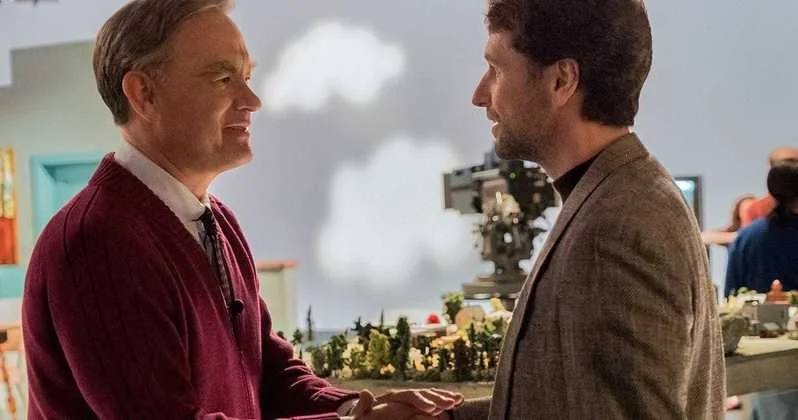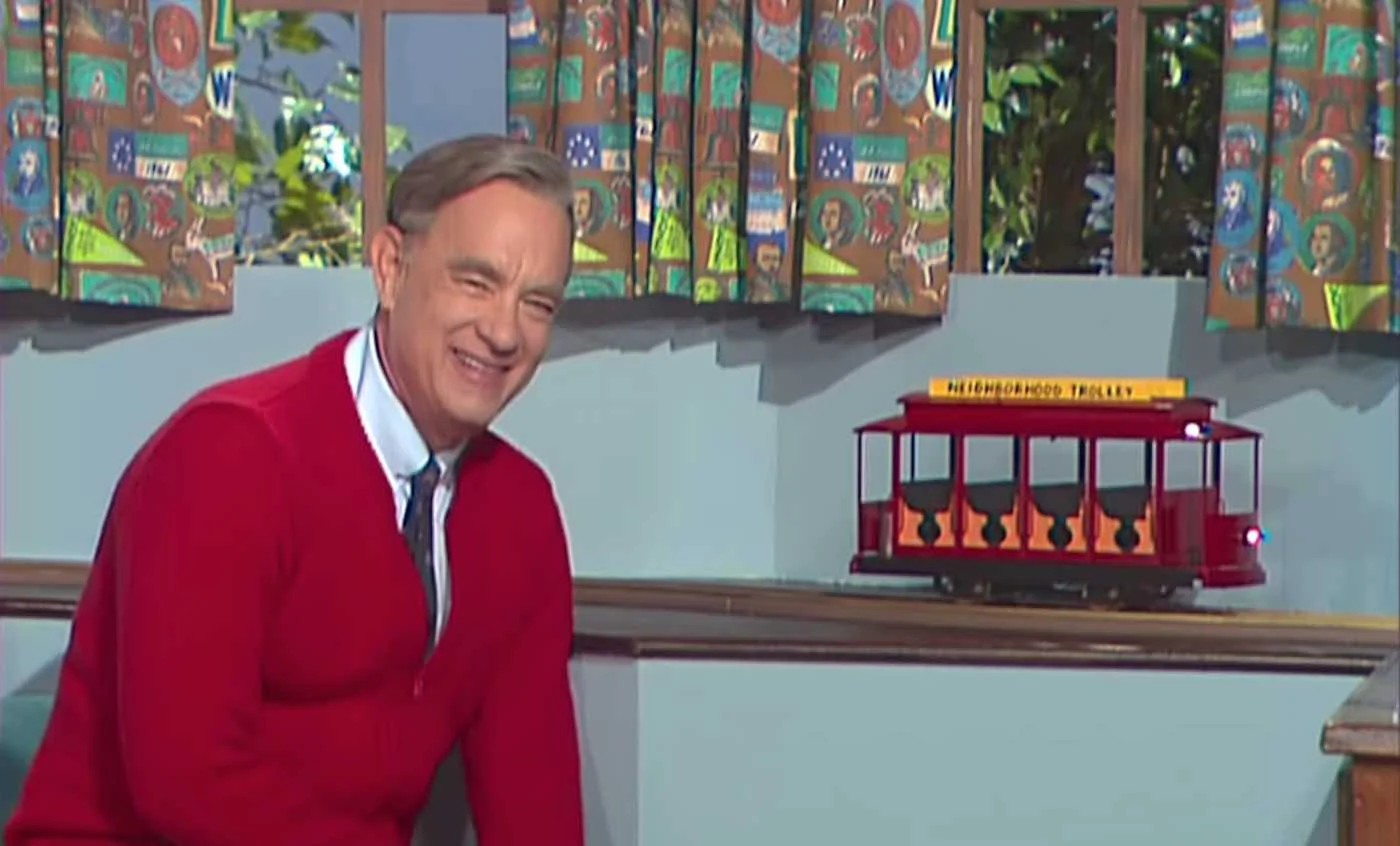A Beautiful Day in the Neighborhood
Editor’s Warning: This is a review of a film shown at the Toronto International Film Festival. There is a chance that this film will not be accessible for a specific period of time, depending on the film’s release date. Be aware that there may be slight spoilers. Proceed at your own discretion.
Very quickly in Marielle Heller’s latest cinematic marvel A Beautiful Day in the Neighborhood, we can tell that this is no ordinary biopic. We see Mr. Rogers do his usual routine (here he is obviously played by Tom Hanks). He then starts talking to us, and doing what he does best: explaining confusing problems that we cannot wrap our heads around. He shows us a few pictures of friends of his, and he then shows us a battered Lloyd Vogel (who is based on Esquire journalist Tom Junod, whose article on Fred Rogers serves as the basis of this film). We know right away that this is something special. We are having Vogel’s complicated life unraveled and made visibly solvable for us. Heller tries to implement the cautious teachings of the late television icon with this touching drama, and she does an excellent job (along with the help of screenwriters Noah Harpster and Micah Fitzerman-Blue).
We also deduce that this really isn’t about Fred Rogers at all, rather this is a biopic on Junod’s weeks in touch with Fred Rogers (once again, Junod is replaced with Lloyd Vogel). Technically, Fred Rogers aimed to make all of his waking moments about others and not himself, so it’s only fitting that his “biopic” has more to do with his interviewer than the actual subject. It’s simply a pro-Rogers move after all. The entire film is depicted like a mature Mr. Rogers episode, with square ratios, ‘90s television quality (to replicate the 1998 era of the interview, of course), and even the toy neighbourhood being turned into Vogel’s own stomping grounds. So much work was put into making this vision come to life. Somehow, Tom Hanks has a requirement on his contracts that his films must have the best technological advancements possible. Forrest Gump convincingly placed the titular character in old footage. Similarly here, you’ll be damned to know how all of the retro footage in this film is pulled off. I still don’t quite get it.
Vogel meeting Mr. Rogers on set for the first time.
With various moments of the film playing out in a meta fashion (ranging from parts of Vogel’s profession being explained through Picture Picture, and even a kind of strange dream sequence), there are certainly moments of the film that amalgamate Mr. Rogers’ television show with adulthood. Vogel’s life depicted in the film is tricky. He has zero connection with his estranged father, he himself has zero idea as to how he should parent his newborn, and he places his job first (a job where he has alienated everyone from him because of his vicious interview styles). The only person willing to get to know him (outside of his wife) is Mr. Rogers, oddly enough.
What I will say is that the marriage between Vogel’s domestic issues and what he learns from Mr. Rogers does not make for the most unsuspecting story ever, but instead it allows us to reflect on ourselves through Vogel. An absolutely astounding moment in the film features Mr. Rogers asking Vogel to just allow for a minute of silence, so he can soak in every living person in the room. I fully believe Heller allowed an entire minute to go by. All of the Elgin Theatre at the Toronto premiere was dead silent. No awkward laughs. No chatter. Pure, uninterrupted silence. We could connect to everyone on screen; more importantly, we all connected to each other. It’s the kind of achievement that rarely truly works, and yet the very first screening for the world to see, Heller and Hanks’ Mr. Rogers pulled it off with ease. It was a minute of spiritual cleansing that all of us needed.
Portions of the film feature Hanks’ Mr. Rogers addressing us as his audience.
So what if the story is predictable. I don’t think Mr. Rogers would care about that, and neither should we. In all honesty, a number of moments got me teary eyed, and some of those moments had nothing to do with the film. When you see Mr. Rogers bring out Daniel Tiger and talk vicariously through him, you know this is him unleashing his own insecurities to the world. When he tries to get Daniel to talk to Vogel about his own childhood stuffed animal (a plush bunny named Old Rabbit), that’s a certain level of vulnerability that just sent shivers down my spine. Even just seeing Mr. Rogers doing every single thing that he can to connect to children and provide them a place of comfort is enough to touch my heart. Many people at the premiere were heavily breathing, trying to fight back tears. Some people simply could not win that battle.
A Beautiful Day in the Neighborhood is slightly about Mr. Rogers, and it’s — in a way — slightly about Tom Junod as well. It’s the kind of film that just feels necessary now. We don’t really have central figures like Mr. Rogers out there. We do have Tom Hanks, though. Heller was quick to defend Hanks at the Toronto premiere, saying that, yes, Tom Hanks is a perfect casting choice, but Hanks put in a hell of a lot of work to become Mr. Rogers (it pays off, with a heartwarming, yet completely candid, performance). She went on to say that Mr. Rogers himself put all of his heart into what seemed effortless, so children weren’t pushed away by stress or strain. Heller, Hanks, and everyone else involved, put this same amount of heart into a film meant to remind us that the neighbourhood Mr. Rogers discussed was our own. He wanted to be a part of ours, every time we made space for him on our own television sets. A Beautiful Day in the Neighborhood is an example of the millions of lives Mr. Rogers bettered, and it’s completely applicable to ourselves. Please let this film nourish you; we need more neighbours like Mr. Rogers in 2019.
Andreas Babiolakis has a Masters degree in Film and Photography Preservation and Collections management from Ryerson University, as well as a Bachelors degree in Cinema Studies from York University. His favourite times of year are the Criterion Collection flash sales and the annual Toronto International Film Festival.






